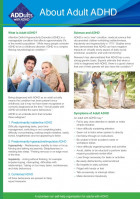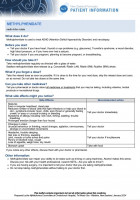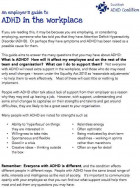ADHD in adults | Aroreretini ki ngā pakeke
Also known as attention deficit hyperactivity disorder
Key points about ADHD in adults
- ADHD (aroreretini) is a brain condition that affects your attention, memory and behaviour.
- It was once thought that children with ADHD would grow out of it, but it's now known that for many people it's a lifelong condition.
- This page is about ADHD in adults.
- There are things you can do to make it easier to live with ADHD.

ADHD is a neurodevelopmental condition. This means that if you have ADHD there are differences in the parts of your brain which control your ability to plan, organise and focus compared to those without it. ADHD affects about 1 in 20 adults – that’s about 280,000 New Zealanders.
Brain scans and studies of brain function show ADHD brains are wired differently from other people's. The physical and chemical differences affect executive function. Executive function is like the CEO of a company – it's the parts of your brain that control and co-ordinate the rest of your brain. This makes it harder to concentrate on things you don't find interesting and to regulate (be in charge of) your behaviour.
The main features of ADHD are:
- difficulty paying attention (eg, to workplace tasks, conversations, or personal belongings)
- hyperactivity (eg, fidgeting or being unable to sit still, talking or thinking a lot)
- impulsivity (eg, interrupting conversations, difficulty waiting in line).
ADHD is usually diagnosed in childhood. Until recently it was thought that children grow out of ADHD, but it's now known that about 7 out of 10 children with ADHD will still have symptoms as adults. You may have ADHD throughout your childhood but not be diagnosed until you’re an adult.
ADHD often comes with energy and creativity and, if used well, this can help you learn how to manage the more challenging aspects of ADHD as an adult.
Video: ADHD in adults
(Healthify He Puna Waiora, NZ, 2024)
The exact cause of ADHD isn’t known. It's found in about 5 to 7% of people from all ethnicities. It’s more commonly diagnosed in boys and men. This may be because it’s not as obvious to other people in girls and so it's diagnosed later.
It’s likely to be a genetic condition, which runs in families. If one parent has ADHD there’s a 70 to 80% chance of a child having it. Research shows that ADHD probably results from the combination of several genes interacting with environmental risk factors.
These risk factors are thought to include:
- brain injury
- exposure to alcohol or nicotine before birth
- premature birth
- epilepsy
- exposure to toxins such as lead in childhood.
People with ADHD have differences in the size, connections and neurotransmitters (chemical messengers between brain cells) in parts of their brains compared to people without ADHD.
Having ADHD is also related to other neurodevelopmental conditions, such as autism spectrum disorder, and learning disabilities such as dyslexia.
The video below talks about the parts of the brain and the neurotransmitters that are involved in ADHD.
Video: Sarah on "what's ADHD?"
ADHD is not caused by poor parenting, absent fathers, too much sugar, food additives, TV, video games or vaccines. These possibilities have been studied and found not to be causes.
ADHD can bring benefits, including:
- high energy
- being creative and a good problem solver
- a good sense of humour
- being entrepreneurial and enterprising
- tenacity (being determined)
- being able to hyper-focus on favourite topics, activities, games or sports
- the ability to respond quickly in a crisis
- a strong sense of social justice, a drive to support the under-dog
- being sensitive, insightful and empathetic
- being a person who takes a chance and embraces opportunities.

Image credit: Canva
There are key symptoms used in the diagnosis of ADHD.
Inattention (problems with paying attention)
Examples of inattention symptoms are:
- inability to focus on a task for a long time
- poor attention to detail
- being disorganised (for example being unable to use diaries or calendars regularly)
- forgetting things
- being easily distracted
- delaying attending to tasks
- unreliable work habits
- forgetting appointments
- having more accidents
- daydreaming or switching off in classes or meetings
- poor time management.
You may be able to concentrate when you really enjoy something but lose track when you get bored.
Hyperactivity (being unusually active)
Hyperactivity may be:
- feeling agitated or nervous
- being unable to sit still and concentrate
- talking non-stop with little awareness of your surroundings
- rapid thoughts or being unable to stop thinking
- having sleep problems.
Impulsivity
Symptoms of impulsivity can be:
- starting things and not finishing them
- not considering the consequences of your actions
- interrupting other people
- taking over what someone else is doing
- having problems with money
- changing jobs frequently
- using drugs or alcohol
- getting speeding tickets or having car accidents
- having a hot temper or being irritable.
ADHD symptoms can be different in adults than they are in children. Inattention may be the biggest problem. Hyperactivity may be more a feeling of restlessness or fidgeting rather than moving around the room. Impulsivity can be more verbal, such as interrupting conversations, rather than the physical impulsivity children have.
Adults with ADHD often have other symptoms too, which are not part of the official diagnosis, such as:
- Executive dysfunction: Executive function is the mental processing needed to choose goals and make plans, take action and keep moving towards those goals. With ADHD you may struggle with working memory, changing between different tasks and thoughts, monitoring yourself, starting things, and self-inhibition (stopping some things that, thinking back, would have been better not done or said). Executive dysfunction also contributes to inattention problems.
- Emotional dysregulation: This is difficulty in managing uncomfortable emotions when necessary, and behaving appropriately when distressed. Emotional dysregulation can show up as mood swings, angry outbursts, low motivation, irritability and difficulty putting up with frustration.
- Time agnosia: This is difficulty judging the passing of time, estimating how long things will take or remembering the order things happen in. This can show up as lateness and losing track of time. Other people in your life can take this to mean you don't care or don't respect them.
These symptoms may not be obvious to others. Many people develop ways to hide the symptoms. This is called masking. Masking can be exhausting and can have a negative impact on your mental health.
Because of the challenges of ADHD, you may develop relationship, work, emotional and lifestyle difficulties.
Other conditions
It’s common to have other mental health conditions as well as ADHD. These include:
- depression
- anxiety
- bipolar affective disorder
- substance use disorders
- obsessive compulsive disorder
- eating disorders
- sleep disorders
- personality disorders.
There is no simple test for ADHD. The diagnosis needs to be made by a mental health professional with experience in assessing ADHD.
Generally, adults are only diagnosed with ADHD if there's evidence that they had symptoms as a child. Symptoms also have to be present in more than 1 situation (eg, at work and at home) and affect daily life.
A range of checklists and assessment tools may be used. The one most often used in Aotearoa New Zealand is the Adult Self-Report Scale for ADHD.
What if I think I have ADHD?
If you complete a checklist like this and the results suggest you may have ADHD, take it to your healthcare provider to talk about. It’s best not to diagnose yourself. This is because there may be another cause for your symptoms which needs a different management plan. Or you may have both ADHD and something else, which makes diagnosis more difficult. ADHD symptoms can also be experienced by most people in some situations, usually in a milder way.
In Aotearoa New Zealand a good place to start is your own GP or nurse practitioner. They will talk with you about what you’ve noticed, and will probably ask you to complete a screening questionnaire. It's good to get some information about you from whānau or close friends who knew you as a child.
If ADHD is a possibility, they will discuss referring you to a mental healthcare provider. This is usually a psychiatrist, a doctor specialising in mental health, who can prescribe medicines. Or it could be a neuropsychologist, who has studied psychology at university and has extra training in brain conditions.
Some mental healthcare providers in the private system accept self-referrals. This means you can make an appointment without seeing your GP or nurse practitioner first. Some offer online assessments.
Assessment
Assessment might involve:
- tests of your thinking (psychological tests)
- a physical check-up that might involve testing your heart, blood tests or a brain scan to rule out other problems
- questions about your childhood
- an interview with a partner, parent or close friend about your behaviour
- review of documents such as old school reports.
The symptoms you have and the impact they have on your life are used to decide whether you have ADHD and, if so, which type. There are 3 types of ADHD:
- Hyperactive or impulsive type (or both).
- Inattentive type (similar to what was known as attention deficit disorder or ADD).
- Combination type.
Read more about getting an assessment for ADHD(external link).
ADHD diagnosis has become more common recently. There are lots of possible reasons for this, including better understanding of ADHD in girls and women, and more awareness of ADHD amongst the general public and healthcare providers.
Some people incorrectly say that ADHD is ‘fashionable’ or ‘made up’. In fact, the first description by a doctor of a disorder resembling ADHD was in 1775. There’s agreement between healthcare providers and research scientists around the world that ADHD is a valid diagnosis.
ADHD itself isn’t becoming more common. People who had been living with undiagnosed ADHD are now being diagnosed. This is a good thing because undiagnosed and untreated ADHD can have serious impacts on relationships, employment, mental health and even lifespan.
These tips can help you manage your ADHD:
- Learn about your brain.
- Connect with other people with ADHD (eg, through the ADHD New Zealand closed Facebook group(external link)).
- Share your diagnosis with other people who love you, this helps your relationships run more smoothly.
- Let off steam by exercising regularly.
- Allow more time than you think you need. Use alarms.
- If you can afford it, consider an ADHD coach or virtual assistant.
- Regularly set aside time to plan what you need to do. One at a time try lists, diaries, visual reminders, post it notes, apps. Use what works for you and let go of what doesn't - without beating yourself up.
- Harness your strengths. Think of ways to use interest, novelty, passion, challenge or urgency to get difficult things done.
- Setting up daily routines reduces stress. For example, putting your keys in the same place near the door as soon as you come home every time means you won't be hunting for them when you need to leave.
- Consider whether your job suits the way your brain works – if not, can you make changes?
- Find ways to help you relax, such as listening to music or learning relaxation techniques.
- Work on ways to improve your sleep. Putting off going to bed, or not being able to sleep once you get there is common.
- Talk to your doctor about driving – it’s much safer on medication than without it.
- Practicing mindfulness or yoga is helpful for many people.
- If you have neurodiverse children they'll have extra parenting needs. Consider getting support with this. See The Incredible Years(external link) and Triple P Centre(external link) websites for more information.
Apps reviewed by Healthify
You may find it useful to look at some meditation and mindfulness apps.
Videos
New Zealander's stories about living with ADHD can be found on this ADHD New Zealand webpage(external link).
Treatment is with a mental healthcare provider who has experience in treating people with ADHD. It includes:
- education to understand how to work with your brain, rather than expecting it to work like other people’s
- cognitive behavioural therapy (CBT)
- social skills training
- addressing any drug or alcohol addiction
- treating any related conditions, or conditions resulting from unrecognised ADHD
- helping you get support from friends or family who can be encouraging rather than critical or controlling
- medicines, if you choose to use them.
Medicines
Medicines can be used to support other changes to your lifestyle and behaviour. They can help you to concentrate better, be less impulsive, feel calmer and learn and practice new skills.
In Aotearoa New Zealand, medicines used to treat ADHD in adults include:
- methylphenidate (Concerta, Ritalin, Rubifen)
- dexamfetamine (Dexedrine) and lisdexamfetamine (Vyvanse)
- atomoxetine (Strattera).
Funding of methylphenidate and dexamfetamine
In Aotearoa New Zealand methylphenidate and dexamfetamine are funded under a Special Authority, for people who meet the criteria. A special authority means your specialist will need to make an application to Pharmac (the government medicine funding agency) for approval before the medicine can be funded for you.
- From December 2024 Pharmac has removed the special authority renewal requirements for methylphenidate and dexamfetamine.
- This means that once special authority approval has been granted, it won't need to be renewed. Your doctor or nurse practitioner can continue to prescribe them.
- Previously, people needed input from a specialist every 2 years to renew their special authority.
- Read more about the removal of the renewal criteria for stimulant treatments.(external link)
Find out more about medicines for ADHD in adults.
Diet
Research shows that changes in diet don’t improve ADHD symptoms. If you feel there's a clear connection between your symptoms and a particular food, keep a food diary and take it with you to an appointment with a dietitian.
Support
Support is available for people with ADHD in Aotearoa New Zealand through ADHD New Zealand(external link) and The Triple P Centre(external link).
The following links provide further information about ADHD in adults. Be aware that websites from other countries may have information that differs from New Zealand recommendations.
ADHD in adults(external link) ADHD New Zealand
Research papers(external link) ADHD New Zealand
What is ADHD?(external link) ADHD New Zealand
Attention deficit hyperactivity disorder(external link) Patient Info, UK
ADDitude(external link) by WebMD LLC Range of resources from blog articles, newsletters, to webinars and much more.
Podcast
Podcast: The Neurodivergent Woman(external link) Australian clinical psychologist Monique Mitchelson and clinical neuropsychologist Michelle Livock educate and inspire women who think differently
Brochures
About adult ADHD(external link) ADDults with ADHD (NSW) Inc. A good resource for sharing your diagnosis with family or friends
How is ADHD Treated?(external link) Australian ADHD Professionals Association Ltd
Methylphenidate for ADHD(external link) NZ Medicines Formulary
An employer’s guide to ADHD in the workplace(external link) Scottish ADHD Coalition, UK
ADHD in adults(external link) The Royal Australian and New Zealand College of Psychiatrists
Apps
Meditation and mindfulness apps.
Books
Barkely RA Taking charge of adult ADHD(external link) The Guilford Press, 2021
Moriah C. This is ADHD – an interactive and informative guide(external link) Allen and Unwin, 2023 an illustrated workbook by a New Zealand author
Solden S, Frank M. A radical guide for women with ADHD – embrace neurodiversity, live boldly and break through barriers(external link) New Harbinger, 2019
Kolberg J, Nadeau K. ADD-friendly ways to organize your life(external link) Routledge, 2016
Orlov M, Kohlenberger N. The couples' guide to thriving with ADHD(external link) Specialty Press, 2014
References
- Attention deficit hyperactivity disorder in adults(external link) Better Health, Australia, 2023
- Attention deficit hyperactivity disorder – diagnosis and management(external link) NICE guideline, UK, 2018
- ADHD across the lifespan(external link) The Royal Australian and New Zealand College of Psychiatrists, 2023
- ADHD in adults(external link) Mental Health Foundation, NZ, 2024
- Attention deficit hyperactivity disorder(external link) NHS, UK, 2018
- Attention deficit hyperactivity disorder (ADHD) in adults(external link) Royal College of Psychiatrists, UK, 2023
- Martinez-Badía, Martinez-Raga J. Who says this is a modern disorder? The early history of ADHD(external link) World J Psychiatry 2015;5(4):379-386
- Attention deficit hyperactivity disorder in adults – epidemiology, clinical features, assessment and diagnosis(external link) UpToDate, 2023 (subscription only)
- The positive aspects of attention deficit hyperactivity disorder: a qualitative investigation of successful adults with ADHD(external link) Sedgewick et al, ADHD, 2019
- Li L, Zhu N, Zhang L, et al. ADHD pharmacotherapy and mortality in individuals with ADHD(external link) JAMA 2024;331(10):850–860
See the ADHD in adults for healthcare providers page.
Brochures

About adult ADHD
ADDults with ADHD (NSW) Inc

Methylphenidate for ADHD
New Zealand Formulary, patient information, 2024
Credits: Healthify editorial team. Healthify is brought to you by Health Navigator Charitable Trust.
Reviewed by: Dr Emma Dunning, Clinical Editor and Advisor
Last reviewed:
Page last updated:






